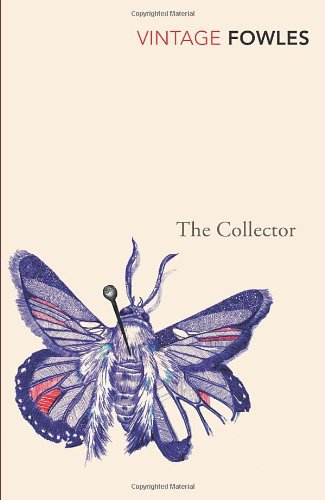The Collector is not the kind of book I used to read much, it is neither fantasy or mythic fiction, neither YA or children literature, or some fairytale retelling, but is had been recommended to me several times, and it was on so many friends' favorite list that when I saw a used copy at a bookstore I grabbed it, hoping I would like it. And I did. I can safely say that it is one of the best book I have read this year.
The Collector is a chilling story of a kidnapper and his victim and the power struggle and obsessiveness at the core of their relationship. Goodreads informs me that this was hailed as the first modern psychological thriller (it was first published in 1963), and it truly takes you into the depths of its two, and only, characters. Told in two parts, first by the kidnapper a lonely butterfly collector and second by the art student he becomes obsessively in love with and ultimately kidnap, "collect". The contrast between the two voices is one of the thing I loved the most about this novel.
The choice to put the captor's POV first was a great idea. We, the readers, are forced to immerse ourselves in this unassuming, seemingly non-violent and calm individual's mind. We are force to see the events through his eyes, to understand them only through his own rationalization. If we do not completely sympathize with him (at first), it's quite easy to understand him, even as the horror of his actions clashes with the tone of his voice. We are also force to see the victim and her actions through his eyes, and can only go by his own interpretations of her behavior which we know to be unreliable, but know nothing beyond what is told to us. Because it is narrated in the first-person point of you, the narrator himself does not delve into his own psychosis, we are not told why he does the things he does beyond his own twisted rationalizations, we only have his voice to go by. His voice is frank, simple, non-dramatic, which only adds to the spookiness of the whole thing, as we constantly feel like digging between the lines, to understand why, why why, but are not offered any respite, any answer, just the facts of the story unfolding before us.
And then the point of view changes to the victim's. Before it was almost easy to forget about what she must have been thinking, or even feeling, so immerse were we into the kidnaper's own mind, but now we are forced to confront the disjointed, panicked and passionate thoughts of his victim, in the form a journal entries. These entries are personal, meandering, weaving in and out of the present and the past. You feel that in an effort to comfort herself, to keep her mind off things, while she lives in a room, in the basement f a house, at the mercy of a man who feeds her and buys her things, but does not seem to want more than spend time with her (nothing sexual or perverted either), she writes and writes about her life, about her love. Feeling trapped and more and more desperate to be free, she writes about the man that has kidnapped her, yes, but also about art, about friends, about philosophy and the things she wants to do, and the things she regrets, and the things she cares about. And we, as the readers, are forced to realize how alive a person can be. This second part is a bit longer, and less plot-driven, slower, more introverted, a complete contrast with the direct, simple point of view at the beginning, exacerbating the contrast between these two characters as the novel comes to its, ultimately unavoidable, conclusion.
And finally the epilogue, from his point of view again, is chilling to the bone.
I didn't know I would like this book at first, and I am glad I took the chance, even if I hadn't loved it as much as I did, it is a tightly well woven novel that brought shivers to my spine.
Subscribe to:
Post Comments (Atom)










Very interesting. You've made me want to read it...
ReplyDelete